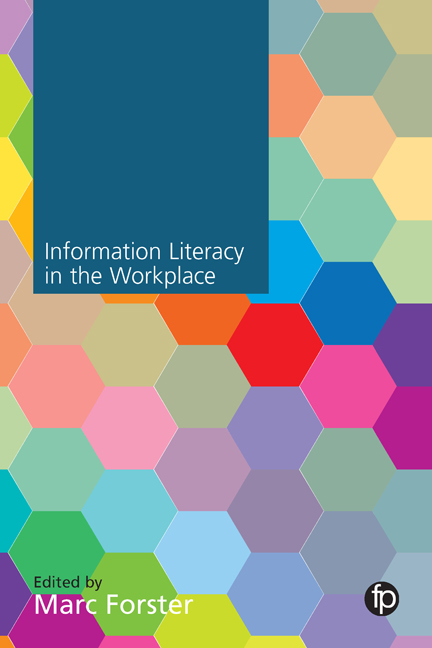Book contents
- Frontmatter
- Contents
- Figures and tables
- Contributors
- Foreword
- 1 Information Literacy and the workplace: new concepts, new perspectives?
- 2 How is Information Literacy experienced in the workplace?
- 3 Information Literacy and the personal dimension: team players, empowered clients and career development
- 4 From transaction to transformation: organizational learning and knowledge creation experience within Informed Systems
- 5 Virtuality at work: an enabler of professional Information Literacy
- 6 Determining the value of Information Literacy for employers
- 7 Information Literacy's role in workplace competence, ‘best practice’ and the ethics of professional obligation
- 8 Learning within for beyond: exploring a workplace Information Literacy design
- 9 Developing information professional competences in disciplinary domains: a challenge for higher education
- 10 The ‘hidden’ value of Information Literacy in the workplace context: how to unlock and create value
- 11 The ‘Workplace Experience Framework’ and evidence-based Information Literacy education
- References
- Index
2 - How is Information Literacy experienced in the workplace?
Published online by Cambridge University Press: 08 June 2018
- Frontmatter
- Contents
- Figures and tables
- Contributors
- Foreword
- 1 Information Literacy and the workplace: new concepts, new perspectives?
- 2 How is Information Literacy experienced in the workplace?
- 3 Information Literacy and the personal dimension: team players, empowered clients and career development
- 4 From transaction to transformation: organizational learning and knowledge creation experience within Informed Systems
- 5 Virtuality at work: an enabler of professional Information Literacy
- 6 Determining the value of Information Literacy for employers
- 7 Information Literacy's role in workplace competence, ‘best practice’ and the ethics of professional obligation
- 8 Learning within for beyond: exploring a workplace Information Literacy design
- 9 Developing information professional competences in disciplinary domains: a challenge for higher education
- 10 The ‘hidden’ value of Information Literacy in the workplace context: how to unlock and create value
- 11 The ‘Workplace Experience Framework’ and evidence-based Information Literacy education
- References
- Index
Summary
This chapter will discuss:
• how researchers have sought to understand Information Literacy (IL), including how it is ‘experienced’ in the real world.
• how IL can be understood as something experienced in a range of contexts meaningful to the individual and relevant to her/his contributive engagement with the workplace.
• how IL experience can be investigated to show the kinds of purposeful knowledge development activities that it facilitates and that are key to the functioning workplace.
Introduction
According to the information theoretician Luciano Floridi, knowledge is information which is both significant and true in its meaning (Floridi, 2010); a sufficiency of which, when brought into relationship with existing knowledge (learning), leads to increased understanding and more effective decision making (Megill, 2012; Hoyt, Bailey and Yoshihashi, 2012). Information Literacy operates at the information–knowledge crux: seeking, sorting, evaluating information; managing and presenting true information within new structures and relationships of knowledge. It is experienced by someone who can ‘synthesis[e] …. information and data to create new knowledge’ (SCONUL, 2011, 11) and so promote learning.
The findings derived from a study of the experience of IL in the nursing profession (Forster 2015a) appeared to show that IL is always an experience of the development of the knowledge, and hence the knowledge-based decision-making abilities, that nurses need in the specific contexts of their practice. The findings from this study, together with an analysis of the findings of several previous studies in IL experience (e.g. Boon, Johnston and Webber, 2007; Diehm and Lupton, 2012; Williams, 2007; Lloyd, 2006; Lupton, 2008; Limberg, 1999; Yates, Partridge and Bruce, 2009), as well as consideration of recent work by Bruce and various colleagues (Bruce and Hughes, 2010; Bruce, Hughes and Somerville, 2012), suggested that this may be true of IL experience in general. IL experience always appears to involve the development of knowledge that is meaningful in specific contexts. In the workplace, IL experiences generate the knowledge that contributes to a greater understanding, and to the successful undertaking, of designated roles and tasks (Forster, 2015a). Such experiences include an awareness of the information required in each workplace context, and the varying sources, processes and ‘coparticipatory practices’ (Lloyd, 2010) needed to develop knowledge as the context varies.
- Type
- Chapter
- Information
- Information Literacy in the Workplace , pp. 11 - 28Publisher: FacetPrint publication year: 2017
- 6
- Cited by

